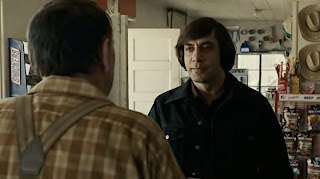2 stars (out of four)
Offhand, I can only recall one instance – no, wait, I’ve
just thought of another – when a character walks at a pace faster than an idle
stroll in To the Wonder, Terrence
Malick’s dispiritingly limp new film. As Mr. Malick’s ever-moving camera swirls
about his subjects, you may find yourself wishing someone would take a sure
step forward and walk with something resembling purpose and conviction.
But this is not a film that places much value on certainty. To
the Wonder, though it is not to be confused
with the imperative Lil’
Jon refrain, does actually feature its share of characters moving to the
windows. Standing beside the windows of homes, churches and motel rooms, they
sometimes caress and kiss one another but more often they simply gaze outside
looking for… for what?
For happiness, I suppose. Also empathy and love. The film’s
characters are trapped inside themselves, longing for a lasting and meaningful
connection to another person. This is, at least, how I saw the movie but it is
abstract enough to invite multiple interpretations.
To the Wonder
follows, in mostly linear fashion, a relationship in decline. A French woman
(Olga Kurylenko), abandoned by another man some years earlier, decides to move
to a rural Midwestern town where she and her daughter (Tatiana Chiline) will
live with an American man (Ben Affleck). Terrence Malick also interweaves
memories from the past, chases tangents by following the lives of other
townspeople and ends on what I understood to be a fantasy.
We never learn how the two met but it is soon clear that the
romance is now gone and the love was perhaps never there to begin with. Ben
Affleck’s character as we see him is cold and detached. He is usually down for
some fondling (beside one of those windows) or sex but we can see from the
anguished expressions of Olga Kurylenko that something vital is missing from
their relationship.
This man remains at a distance, not only from Ms. Kurylenko,
but from us as well. His presence looms large over the film but we never get a
sense of his internal emotions, not even when he is alone. He wanders through
the muck and dirt of construction sites, apparently surveying the damage being
done to the town’s water, which has been tainted by chemicals, but no
expression ever crosses his face. Is he weary? Defeated? Indifferent? Mr.
Malick does not offer any clues. Ben Affleck has hardly any lines in the entire
film; he just walks around stone-faced and vacant-looking.
Call it an artistic gamble, an experiment, a bold choice,
but it drains the emotional power from the movie. And with the heart of the
film missing, its curious diversions are all the more frustrating. The
midsection of the film, which depicts a romance between Ben Affleck and an old
flame played by Rachel McAdams, adds nothing new. He is the same with her as
with Ms. Kurylenko. An opportunity to flesh out a new side to this opaque
character is lost.
Javier Bardem, as a priest, walks around town, speaking with
and blessing the impoverished. Some are physically deformed from the
contaminated water. His scenes in this ostensible leper colony offer some
fascinating images worth chewing on and mulling over but they feel too
disconnected from the rest of the film. It is difficult to know what to make of
them.
And this is what makes To the Wonder such a tantalizing but ultimately underwhelming
film. Mr. Malick is known for shooting lots of material and whittling it down
to its final form in the editing room, and the results are usually mesmerizing.
His films are lyrical suites of images and naturalistic moments caught on film;
structurally, they resemble musical compositions more than narrative
storytelling. But something is missing this time.
You get the sense that the raw material of To the Wonder has potential to make a very strong movie but that
Terrence Malick has cut the film in a way that dampens this material’s impact
and mutes the emotions. There are at least a dozen breathtaking shots in To
the Wonder and I find myself thinking about
the film days later, recalling images from it the way one does a dream. All the
more disappointing then that the actual experience of watching To
the Wonder was such a chore.
The exception is Olga Kurylenko who, particularly in the
film’s second half, gives a forceful performance. She is lonely and desperate
for love, and cannot understand why the man who invited her to live with him
continues to deny her any kind of real intimacy. In one scene, a friend (Romina
Mondello) visits her and the two stroll through the wide streets of this flat
Midwestern town (leisurely of course). The friend yells out. Where is everyone?
Is this whole town dead? Where is the life? The passion? All valid questions.
- Steve Avigliano, 5/2/13


